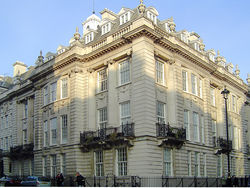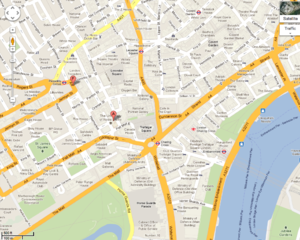London CPS Workshop: Difference between revisions
| Line 32: | Line 32: | ||
* Marika Di Benedetto, ''Analysis and Control of Networked Embedded Systems'' | * Marika Di Benedetto, ''Analysis and Control of Networked Embedded Systems'' | ||
* Maurice Heemels, [[Media:2p_summary_v8.pdf|''Event-Triggered and Self-Triggered Control Design with Guaranteed Performance'']] | * Maurice Heemels, [[Media:2p_summary_v8.pdf|''Event-Triggered and Self-Triggered Control Design with Guaranteed Performance'']] | ||
* Sandra Hirche, ''Cyberphysical Systems in Robotics - Challenges and Achievements'' | * Sandra Hirche, [[Media:Hircheabstract.pdf|''Cyberphysical Systems in Robotics - Challenges and Achievements'']] | ||
* Tor Arne Johansen, [[Media:Marine_UAS_Operations.pdf|''Integrated UAV Marine Operation Planning for Surveillance, Oil Spill Observation and Arctic Ice Management'']] | * Tor Arne Johansen, [[Media:Marine_UAS_Operations.pdf|''Integrated UAV Marine Operation Planning for Surveillance, Oil Spill Observation and Arctic Ice Management'']] | ||
* Eric Kerrigan, [[Media:CPSWorkshopAbstractKerrigan.pdf|Number Representations for Embedding Optimization Algorithms in Cyber-Physical Systems]] | * Eric Kerrigan, [[Media:CPSWorkshopAbstractKerrigan.pdf|Number Representations for Embedding Optimization Algorithms in Cyber-Physical Systems]] | ||
Revision as of 13:08, 11 September 2012
 |
Workshop on Cyber-Physical Systems |
 |
Workshop Scope and Purpose
Recent technological developments in sensing, communications, control and computation have created an emerging class of complex systems, called Cyber-Physical Systems. Cyber-Physical Systems are characterized by large numbers of tightly integrated heterogeneous components in a network, which may expand and contract dynamically. Cyber-Physical Systems are very common and are becoming increasingly ubiquitous. The control of such systems presents huge challenges and requires designs drawn from approaches such as those in traditional control, hybrid control systems, discrete event systems, and networked control. In addition, robustness, reliability and security issues for reconfiguring dynamical systems must also be addressed. This integration of different technologies and scientific domains presents new and challenging fundamental problems underlying the theoretical foundations for this class of systems.
This workshop will bring together researchers in Systems and Control, interested in different aspects of Cyber-Physical Systems, in order to exchange research experiences and to identify the main scientific challenges in this rapidly growing research area. The participation is by invitation.
Participants
- Frank Allgower
- Karl-Erik Årzén, Simulation of Cyber-Physical Control Systems
- Alessandro Astolfi, Model Reduction of Nonlinear Systems
- John S. Baras, Components, Compositionality and Architectures for Networked CPS
- Antonio Bicci, Trading off Feedforward and Feedback, Remote and Local in the Control of Complex Interconnected Plants
- Eduardo F. Camacho, Control of Solar Thermal Plants
- Carlos Canudas-de-Wit, CPS in Intelligent Transportation Systems: the Grenoble south ring show case
- Claudio De Persis, Coordination Control in a Cyberphysical Environment
- Marika Di Benedetto, Analysis and Control of Networked Embedded Systems
- Maurice Heemels, Event-Triggered and Self-Triggered Control Design with Guaranteed Performance
- Sandra Hirche, Cyberphysical Systems in Robotics - Challenges and Achievements
- Tor Arne Johansen, Integrated UAV Marine Operation Planning for Surveillance, Oil Spill Observation and Arctic Ice Management
- Eric Kerrigan, Number Representations for Embedding Optimization Algorithms in Cyber-Physical Systems
- Alkis Konstantelos
- Xenofon Koutsoukos, Resilient Cooperative Control of Cyber-Physical Systems
- Stefan Kowalewski, Architectural Support for Agile Control Design in CPS
- Kostas Kyriakopoulos, A Framework for Aperiodic Model Predictive Control
- Francoise Lamnabhi-Lagarrigue
- Jan Maciejowski, Some New Developments in Model Predictive Control
- Thomas Parisini and Marios PolyCarpou, Towards Safe and Reliable CPS: A Learning-Based Distributed Fault-Diagnosis Approach
- Joerg Raisch, Control Hierarchies and Tropical Algebras
- Malcolm Smith, Classical Network Synthesis Revisited
- João Sousa, Coordination Challenges in Networked Vehicle Systems: Are We Missing Something?
- Janos Sztipanovits, Towards Model-Based Software Synthesis for Resilient Control Systems
- Anthony Tzes
- Arjan van der Schaft, Bisimulation Theory for Multi-Modal Physical Systems
- Richard Vinter
- Zoran Vukic
Organizers
The organizers are:
- Panos Antsaklis, antsaklis.1@nd.edu, Electrical Engineering, University of Notre Dame
- Bill Goodwine, bill@controls.ame.nd.edu, Aerospace and Mechanical Engineering, University of Notre Dame
- Vijay Gupta, Vijay.Gupta.21@nd.edu, Electrical Engineering, University of Notre Dame
- Karl Henrik Johansson, kallej@kth.se, School of Electrical Engineering, KTH Royal Institute of Technology
Date and Location
The workshop will be on Saturday and Sunday, October 20-21, 2012. It will start Saturday morning and end at approximately noon on Sunday. It will be held at the London Centre of the University of Notre Dame.
|
University of Notre Dame in London |
 |
Acknowledgements
The organizers would like to acknowledge the support of the National Science Foundation, Research and Sponsored Programs of the University of Notre Dame, College of Engineering, Department of Electrical Engineering; and of the Brosey endowed chair of the University of Notre Dame .